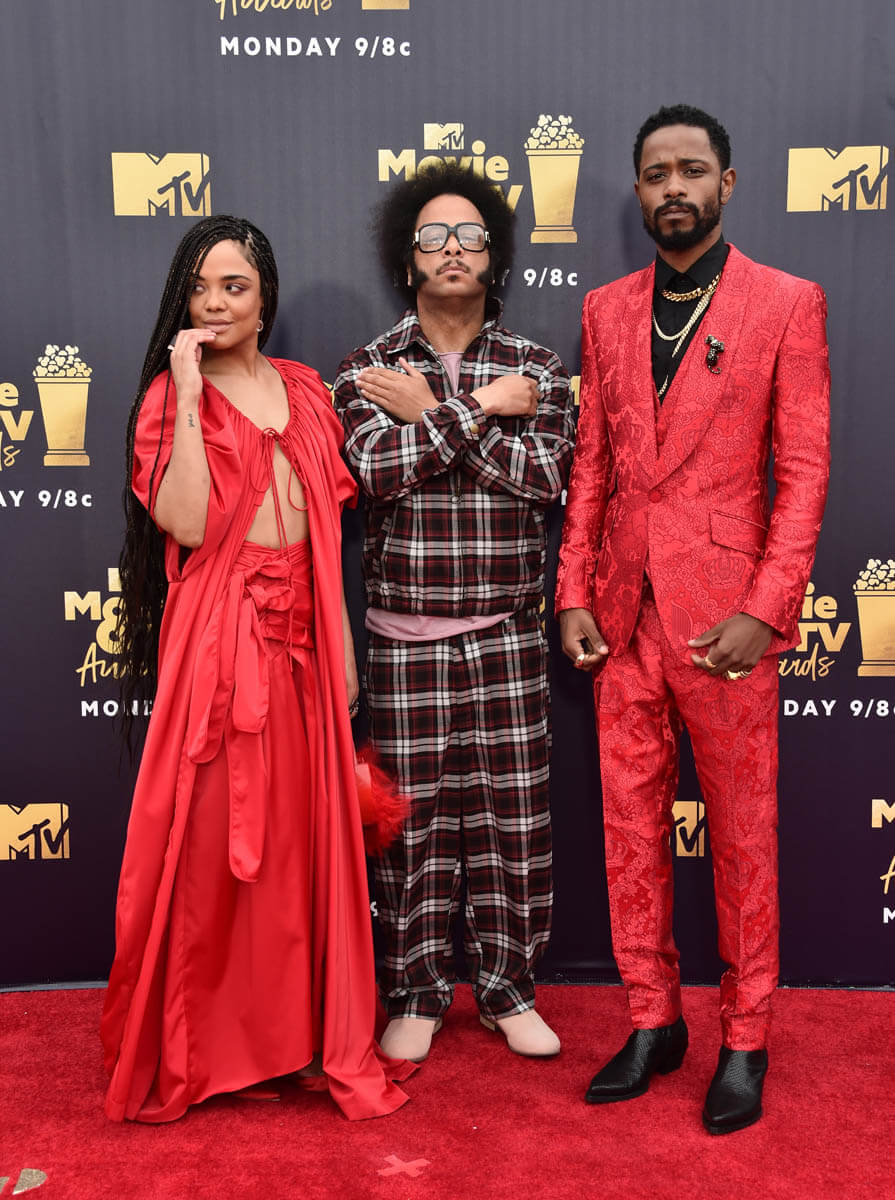Sorry to Bother You review



Coming out of Sundance, Boots Riley’s debut film, Sorry to Bother You, was hailed as “the next Get Out”, and it’s not hard to understand the comparison. Like Get Out, Sorry announces the arrival of a major new filmmaker, and like Get Out, it is (partly) about how America exploits its black citizens, particularly how it exploits black excellence, and specifically how that exploitation exists to maintain a white supremacist status quo. But to see Sorry to Bother You solely through the lens of “the next Get Out” is to miss 98% of what Sorry is doing, so no, it’s not the next Get Out, it’s the first Sorry to Bother You.
Hip hop artist Boots Riley changes gears, writing and directing Sorry and sharing with us his gonzo vision and sharply satirical voice. The film Sorry really reminds me of is Hereditary, in that it starts out normal enough and then gets progressively weirder until it becomes something else entirely. Sorry takes the hardest of all left turns possible, and becomes a deeply bizarre and singularly scathing critique of our capitalist dystopia, but it starts out as a normal-enough story about a couple of crazy kids just trying to make it in said capitalist dystopia. Cassius Green (Lakeith Stanfield) lives in his uncle’s garage, but his uncle, Sergio (Terry Crews), is on the verge of losing his house, unable to keep up with his mortgage. To try and make ends meet, Cassius takes a job as a telemarketer.
The first sign that Sorry is going to get weird is a background gag during Cassius’s interview, as a couple guys try to repair a copier only for the problem to get immediately worse. It’s a pretty standard visual gag, but it happens in the IMMEDIATE background of the scene. It’s not some distant bit you might miss at first, it is RIGHT THERE. It’s practically an announcement that subtlety has left the building. Sorry is not the least bit interested in being subtle, it’s bursting with too much energy and too many ideas for that. Riley covers everything from corporate America to labor organization to the inherent hypocrisy of consumable art to the corporate hijacking of protest. Remember that Pepsi ad where Kendell Jenner solves racial injustice? That has an uncanny echo—pardon the pun—in Sorry.
Once Cassius goes to work, things start sliding sideways pretty quick. At first unsuccessful, he’s counseled by an older black employee, Langston (Danny Glover), to use his “white voice” in order to get customers to listen to his pitch. Cassius, it turns out, has a great white voice—dubbed by David Cross—and rises meteorically through the company. But in America success is conditional, and in order to continue his climb, Cassius must abandon Detroit, Salvador, and union organizer Squeeze (a ludicrously well-photographed Steven Yeun), and become a scab, crossing his friends’ picket line. But hey, now he’s in with the company CEO, Steve Lift (Armie Hammer), so he’s made it, right?
Well, again, success in America is conditional. Riley proposes it is conditional on how much humiliation you are willing to suffer, and that the quota is even higher for successful African-Americans. Besides suffering the regular humiliations of being a cog in a corporate machine and working for a clearly insane boss, he also has to deal with the humiliations and denigrations of being one of only a few people of color in a predominately white space. He’s expected to entertain his white colleagues because surely, he must know how to rap. He’s expected to make inhumane sacrifices because why else would he be allowed into white spaces if not to serve white needs? Sorry has a gonzo comedy tone, but it exposes the fundamental cruelty of our society over and over again, and many scenes make you wince as much as you laugh. More than one scene is simultaneously hilarious and outright horrifying.
Sorry to Bother You is a helluva calling card for Boots Riley as a filmmaker. Its wild comedic style almost masks what a major work this is, but it is a MAJOR work. It’s overflowing thematically and ideologically but Riley’s thesis is cohesive and his message so refined that every piece of the film, even the utterly bizarre ones, work toward his narrative goals. There is a lot going on but it all comes back to exploitation and our broken f*cking system that not only allows for it but in fact rewards and celebrates it, and how that extracts a terrible price from Americans but most especially black Americans. Sorry to Bother You is an important film, but it’s also an exciting film. It is exhilarating to participate in such a vibrant, vital work, and it is thrilling to watch such a unique vision unfold in just the f*cking WILDEST manner. Go see Sorry to Bother You and let Boots Riley f*ck your mind with art for a couple hours. You probably won’t regret it and you definitely won’t forget it.
